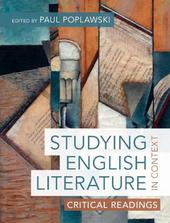
|
Studying English Literature in Context: Critical Readings
Hardback
Main Details
| Title |
Studying English Literature in Context: Critical Readings
|
| Authors and Contributors |
Edited by Paul Poplawski
|
| Physical Properties |
| Format:Hardback | | Pages:674 | | Dimensions(mm): Height 253,Width 193 |
|
| Category/Genre | Literary studies - general |
|---|
| ISBN/Barcode |
9781108479288
|
| Classifications | Dewey:820.9 |
|---|
| Audience | | Tertiary Education (US: College) | |
|---|
| Illustrations |
Worked examples or Exercises
|
|
Publishing Details |
| Publisher |
Cambridge University Press
|
| Imprint |
Cambridge University Press
|
| Publication Date |
13 October 2022 |
| Publication Country |
United Kingdom
|
Description
Ranging from early medieval times to the present, this diverse collection explores the myriad ways in which literary texts are informed by their historical contexts. The thirty-one chapters draw on varied themes and perspectives to present stimulating new readings of both canonical and non-canonical texts and authors. Written in a lively and engaging style, by an international team of experts, these specially commissioned essays collectively represent an incisive contribution to literary studies; they will appeal to scholars, teachers and graduate and undergraduate students. The book is designed to complement Paul Poplawski's previous volume, English Literature in Context, and incorporates additional study elements designed specifically with undergraduates in mind. With an extensive chronology, a glossary of critical terms, and a study guide suggesting how students might learn from the essays in their own writing practices, this volume provides a rich and flexible resource for teaching and learning.
Author Biography
Paul Poplawski taught in the University of Wales and at the University of Leicester, where he was Director of Studies at Vaughan College and Senior Lecturer in English. He was the General Editor of the two editions of English Literature in Context (2008, 2017), to which he also contributed chapters on 'The Twentieth Century, 1901-39' and 'Postcolonial Literature in English'. He is a member of the Editorial Board of the Cambridge Edition of the Works of D. H. Lawrence and co-author of the third edition of A Bibliography of D. H. Lawrence (2001). In addition to several other books and essays on Lawrence, he has published a book on Jane Austen (1998) and was the editor of Encyclopedia of Literary Modernism (2003). Most recently, he was the guest-editor for the MHRA Yearbook of English Studies for 2020, entitled Back to the Twenties: Modernism Then and Now.
Reviews'An impeccable selection of wide-ranging but sharply focused texts in their historical and cultural contexts by seasoned scholars with a keen sense of the past as well as a sharp eye for essential contemporary issues such as feminism, environmentalism, immigration, and politics. The crisp and succinct essays are packed with engaging questions that suggest lively classroom discussion as well as thoughtful critical examination.' Stephen Kern, Ohio State University 'Studying English Literature in Context helps ease students' transition from second- to third-level study by offering scholarly essays that are written specifically for students. This makes academic writing and argument more accessible to students coming to such material for the first time, with the further resources offering the additional benefit of helping students think more critically about what they are reading. This book offers new university students much needed support as they work towards the broader and deeper critical inquiry in which they will engage at later stages of their programme. It is likely to be widely assigned in undergraduate survey courses and much used.' Naomi McAreavey, University College Dublin 'Driven by the conviction that texts are fruitfully understood within the context of their time, this enormously hospitable and adaptable book manages, without strain, to appeal both to scholars and students, to bookworms and neophytes. It covers the entire history of English literature and drama with a ease and dexterity matched only by ambition and range. The collection deploys an innovative hinged structure in which each of the thirty-one essays is supplemented by a critical reflection that allows the author to reflect upon the preceding essay he or she has just written, while also mapping the scholarly field. Pedagogically, that will afford students a critical example of how to position their own work while also informing them, without dryness, of the scholarly tradition to which they contribute. This collection is suffused with the balm of utility, clear-sightedness and practical good sense and deserves a place on reading lists wherever English literature is nurtured and cherished.' Ronan McDonald, The University of Melbourne, Australia 'Studying English Literature in Context will undoubtedly advance the theory and practice of cultural materialist pedagogy in higher education. I recommend this lively and enjoyable volume as a valuable resource for teachers and students of English Literature and as an excellent anthology of scholarly essays in its own right.' Caroline Franklin, Swansea University 'Studying English Literature in Context is a superb collection of essays by leading scholars that will foster stimulating response, reignite debate, and demand intellectual engagement by readers of representative texts from the long history of English. The authors recognise that from The Dream of the Rood's multivalence to Aphra Behn's colonial novel Oroonoko and Grace Nichols' feminist poetry, literature both contributes to, as well as reflects socio-cultural critique, linking past modes of creative expression with current conversations about form, textual ambiguity, literary resistance, and periodisation. In addition to this impressive set of critical interpretations, generous resources are provided to situate the student in the long chronology and complex range of generic, stylistic, material, and performative possibilities offered by literature. The whole volume works to ensure enhanced understanding of the significance of poetry, prose, and drama both to authors and creators and to audiences globally; as Poplawski anticipates, this book offers contextured readings, encouraging connections between eras, affect, and modalities to amplify the power of the written and spoken word.' Elaine Treharne, Stanford University
|